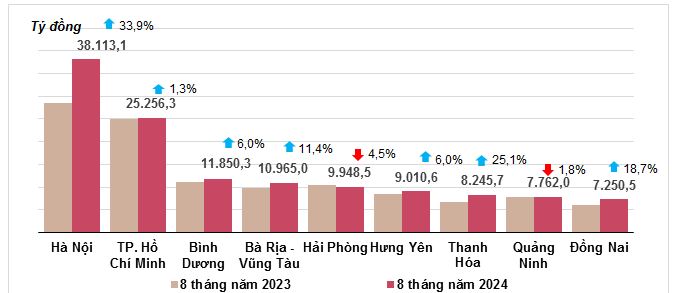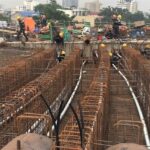The estimated investment capital for August 2024 is 62.1 trillion VND, a 1.3% increase from the previous year. This includes 10.9 trillion VND from central government funds, a 0.5% decrease, and 51.2 trillion VND from local government funds, a 1.7% increase. For the first eight months of 2024, the total estimated investment capital from the state budget reached 363.1 trillion VND, accounting for 47.8% of the yearly plan and a 2.0% increase compared to the same period last year (in 2023, it accounted for 48.6% and increased by 24.5%). Details are as follows:
The estimated investment capital managed by the central government is 62.6 trillion VND, accounting for 50.4% of the yearly plan and a 3.4% decrease compared to the previous year. Specifically, the Ministry of Transport achieved 38.2 trillion VND, a 20.8% decrease; the Ministry of Agriculture and Rural Development achieved 6.1 trillion VND, a 34.6% increase; the Ministry of Health achieved 642.1 billion VND, a 29.5% increase; the Ministry of Education and Training achieved 625.4 billion VND, an 8.1% increase; the Ministry of Natural Resources and Environment achieved 397.3 billion VND, a 40.8% decrease; and the Ministry of Industry and Trade achieved 381.3 billion VND, a 16.9% increase.
The estimated investment capital managed by local governments is 300.5 trillion VND, accounting for 47.3% of the yearly plan and a 3.2% increase compared to the same period last year. This includes provincial-level state budget capital of nearly 201 trillion VND, a 1.9% increase compared to the same period in 2023, accounting for 44.8%; district-level state budget capital of 85.7 trillion VND, a 6.1% increase, accounting for 51.9%; and commune-level state budget capital of 13.8 trillion VND, a 4.1% increase, accounting for 65.1%.
The following table presents the estimated investment capital from the state budget for the first eight months of 2024 for some provinces and centrally-run cities:

Estimated investment capital from the state budget for some provinces and centrally-run cities
|
In the first eight months of 2024, there were 75 new projects granted investment registration certificates with a total capital of 148 million USD from the Vietnamese side, a 39.4% decrease compared to the same period last year. There were also 17 projects with adjusted capital, resulting in a decrease of 736.7 million USD.
For the eight-month period of 2024, the total investment capital from Vietnam to overseas (including new and adjusted capital) reached 147.3 million USD, a 64.6% decrease compared to the same period last year. This included 58.6 million USD in mining, accounting for 39.8% of the total investment; 29.1 million USD in manufacturing, accounting for 19.7%; wholesale and retail sales and repair of automobiles and motorcycles accounted for 24.7 million USD, or 16.8%; professional, scientific, and technical activities accounted for 20 million USD or 13.6%; other services accounted for 10.0 million USD or 6.8%; and production and distribution of electricity, gas, hot water, and air conditioning accounted for nearly 8 million USD or 5.4%.
Rearing in Revenue: The Ministry’s Mandate?
The Vietnamese government has made significant strides in reforming state capital investment management. One notable change is the decision to no longer manage second-tier enterprises and reduce the number of enterprises requiring the Prime Minister’s approval for leadership appointments. These moves signify a shift towards greater autonomy for businesses and a streamlined decision-making process. However, a point of contention remains: how should state-owned enterprises distribute profits when the state does not hold a substantial amount of capital in these businesses? This question sparks an important debate, highlighting the need to balance state involvement and enterprise independence.
“Towards a Seamless Urban Transit Network: Exploring the Feasibility of a Dong Nai-Based Metro Line Extension to Connect with Ho Chi Minh City’s Metro Line 1”
The proposed construction of a 20-kilometer urban railway in Dong Nai province, connecting to the existing Metro Line 1 (Ben Thanh-Suoi Tien), is an ambitious project. This extension will provide a vital transport link to Trảng Bom district, offering an efficient and sustainable travel option for residents and visitors alike. With a total length of 20 kilometers, this new urban railway will be a game-changer for the province, improving connectivity and accessibility while reducing travel times and congestion. This project, as outlined in the investment proposal by the consulting unit, promises to be a transformative development for Dong Nai, offering a modern and efficient transport system that will benefit the community for years to come.
A $300 Million Lakeside Township Project by a Leading Real Estate Developer
Introducing the Sen Ho New Urban Area Project, a visionary endeavor valued at nearly 7 trillion VND. This ambitious undertaking is set to transform the landscape of Hung Yen province, offering a vibrant and modern community for its residents. With a sole investor registered to participate, this project promises a unique and exclusive development opportunity.



















